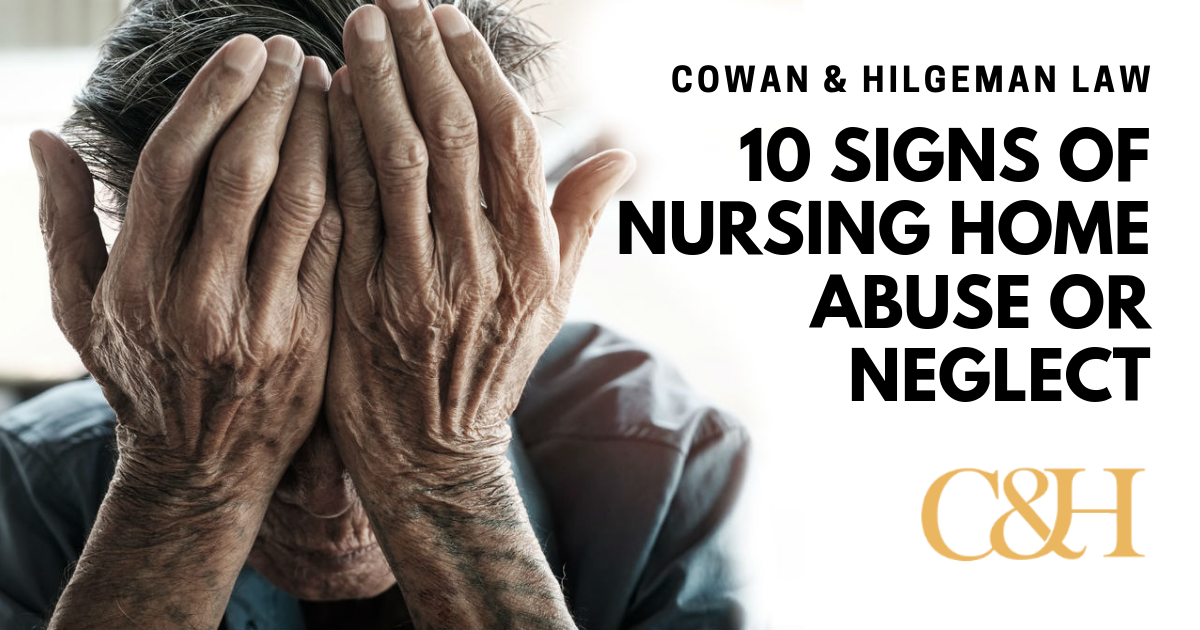The decision to place your loved one in a nursing home is often an enormously emotional one. You are trusting perfect strangers with the care and well-being of an important family member, hoping that trained nursing staff can provide them with the best quality of life possible. Thoroughly researching care facilities can reduce the chance that your loved one is mistreated, but even the most well-recommended nursing homes can hide a dark underbelly.
The frailty associated with old age can rapidly accelerate a decline in health and mental state, if the person in question is not properly cared for. Bed sores, in particular, can go from bad to life-threatening in only a few days, which is why it is vital that you remain vigilant in looking out for signs of nursing home abuse and neglect.
Here are the 10 most common signs of nursing home neglect, abuse and negligence:
1 - Dehydration
Elderly people do not feel thirsty in the same way that younger people do, especially when afflicted by Alzheimer's or Dementia. Dehydration can turn lethal in only a few days, which is why nursing staff must constantly monitor patients' fluid intake and output. If your loved one complains of being thirsty or frequent headaches, has a dry mouth or skin, or feels dizzy often, this can be a sign that they aren't getting enough fluids.
2 - Weight Loss
Weight loss is common among new nursing home residents as they adjust to their new environment and food, but this should be actively monitored by doctors and nursing staff with the help of a nutritionist, if necessary. Meal plans should be adjusted to help bring your loved one back up to a healthy weight. Uncontrolled, untreated weight loss is a clear sign that the patient's basic needs aren't being met.
3 - Poor Personal Hygiene
Nursing homes that neglect their patients' personal hygiene are generally obvious from the moment you walk in the door, but individual neglect is unfortunately quite common. If you notice that your loved one hasn't been bathed as frequently as you would like, voice your concerns immediately to staff. If the problem is not quickly addressed, this can be a sign of more widespread abuse or neglect.
4 - Urinary Tract Infections
Frequent UTIs are a painful symptom of being improperly cared for. If your loved one is forced to wait to use the toilet until staff gets around to helping them, sitting in an adult diaper or soiled underwear for too long, being wiped incorrectly and bathed too infrequently are common reasons a urinary tract infection can develop. They can also be caused by dehydration.
5 - Slip and Falls
Unfortunately, elderly people are always at an increased risk of falling, but if you find that your loved one has fallen frequently or particularly severely, it is important that you find out how and why to prevent re-occurrence.
6 - Dirty clothing, bed clothes and living areas
If you notice odd or foul smells, dirty bed clothes, personal clothing items, overly full trash cans and uncleaned spills, notify staff immediately. Unsanitary conditions can lead to illness and disease, especially among the already frail and medically-compromised.
7 - Over-medication
Some nursing homes have been known to over-medicate their residents to make them more placid, controllable and easy to manage. While it is sometimes necessary to calm patients with Alzheimers or Dementia, psychotropic medication should rarely be used as a long-term treatment plan. If you find that your loved one is often unresponsive, uninterested and zoned-out, it is important to discuss their medication with their doctor. Always feel free to seek a second opinion.
8 - Inexplicable bruising
Elderly people have fragile skin that bruises easily, especially when taking medication to thin the blood. If you notice odd bruises that cannot be easily explained, such as bruises around the wrists or on the breasts/genitals, you may need to conduct a deeper investigation into their care.
9 - Bed Sores
Also known as pressure sores or ulcers, they should not be accepted as a common occurrence in nursing homes. They are always a sign that your loved one is being moved/turned too infrequently, and therefore neglected. Bed sores can go from bad to life-threatening very quickly, so they must be addressed immediately.
10 - Psychological issues
If your loved one becomes quiet, withdrawn, takes less pleasure in things that they are usually interested in, this can be a sign that their psychological state is being neglected. If they engage in self-soothing behaviors such as rocking back and forth, wrist-banging or head nodding, this can be an alarming sign of physical or emotional abuse.
If your loved one displays any of the above signs of nursing home neglect or abuse, fast action is of paramount importance. A diligent, caring nursing staff should take your concerns seriously and formulate a plan of action to address them immediately.
If staff fails to do that, if they try to tell you that you are imagining things or that these are a normal part of life in a nursing home, contact the experienced nursing home abuse attorneys at Cowan & Hilgeman.
There are strict deadlines to file a medical malpractice claim in Ohio, so do not delay in contacting a lawyer that has experience investigating nursing home medical malpractice claims.
The personal injury lawyers at Cowan & Hilgeman have recovered millions in compensation for clients. Our injury lawyers create plans of attack for each case tailored specific to the client’s needs and expectations.
The lawyers at Cowan & Hilgeman handle claims involving personal injury, medical malpractice, nursing home negligence, product liability and wrongful death. We routinely recover compensation on cases that other law firms reject.
Cowan & Hilgeman offers free personal injury case evaluations and only get paid an attorney fee if we win your personal injury case.
Call 937-222-2030 to get your free case evaluation.

